"Newsmaker of the Week" is presented by the SCV Press Club and Comcast, and hosted by Signal Multimedia Editor Leon Worden. The program premieres every Wednesday at 9:30 p.m. on SCVTV Channel 20, repeating Sundays at 8:30 a.m.
This week's newsmaker is actor James Arness, star of the longest running prime-time series in television history — "Gunsmoke." The interview was conducted April 21 at the Arness home in Brentwood. Questions are paraphrased.
Signal: Thank you for inviting us to your lovely home. The city of Santa Clarita is honoring you with a 2006 Walk of Western Stars award.
Arness: Yes, which certainly is a great honor. It's a great pleasure for me to be part of all this.
Signal: The Walk of Western Stars event coincides with Santa Clarita's annual Cowboy Festival, held at the Melody Ranch Motion Picture Studio — which has a particular meaning to you.
Arness: That's for sure. The first couple of years, we did most of our outdoor work right there at Melody Ranch. It's such a great place.
Signal: The story goes that John Wayne was initially offered the part of Marshal Dillon, but he turned it down and recommended you. How did that come about?
Arness: Well, I was under contract to Duke's company for two years before "Gunsmoke" came along. I had been in about four pictures for his company with him. When the "Gunsmoke" offer came in, he said, "I wouldn't be able to do it, but I have a young man here under contract who I think would maybe fit the bill." So he very graciously offered to introduce the first episode. And it was great. It was a wonderful thing. He was a one-of-a-kind guy. There just was never anybody else like him.
Signal: Apparently he appeared in that first episode in September 1955; did you start right off the bat at Melody Ranch?
Arness: We did our first episode there, but he wasn't out there. He just did his piece in the studio. He did the introduction, and then the show came on.
But we did the first couple of years of the show — at least, we did all of our outdoor stuff there at Melody Ranch.
Signal: There were several different Western movie towns at the time; do you happen to know why Melody Ranch was chosen for "Gunsmoke"?
Arness: I don't, really, but it certainly was the ideal place to do these shows. You had all kinds of different locations there including, even, there was a train there.
It was great to be there. And then eventually, in later years, we went to all these various places, out at Thousand Oaks and all that. Great country then. Now it's all built up with condominiums. But back then, there was a lot of great country out there, which we used.
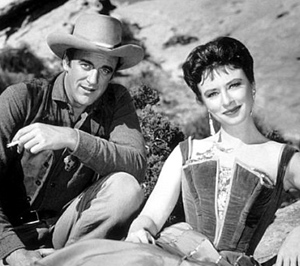
Matt (Arness) and Miss Kitty (Amanda Blake) at Vasquez Rocks.
Publicity photo.
[Click to enlarge]
|
|
Signal: Did you ever visit the real Dodge City at that time?
Arness: We did go. I think it was about the second year of the show. We put together a big bunch of the Western guys and we went back there and had a big celebration.
Signal: At 6-foot-7, you were the "tallest person ever" in a leading role at the time. But when you appear in a shot, you usually don't seem overly large compared to the other actors. Did they stand on crates or something when they were near you?
Arness: Not really. I guess people just had to get used to it. The big thing with the show was that we had a lot of really fine actors, and more than that, we had started out with great writing.
The two gentleman who originated the show — you know, it was on radio for two or three years before they brought it to television — John Meston was the man who conceived the idea of the whole thing. He did most or all the radio shows, and then when it came to television, he did most of those for the first couple of years.
We had great stories, great writing, and we had fine casting and directors. The whole package just came together.
Signal: What was the essence of "Gunsmoke"? What message was it trying to convey?
Arness: I think you could say that compared to most of the Westerns that had been, up to that point in time — no criticism of them, but they were more or less — I wouldn't say "kid shows," but they were more or less kind of "fun-time" Westerns, whereas "Gunsmoke" they dubbed the "adult" Western.
Actually I think it was the premise of it. They told stories of real life and real characters, and stories that we hoped the audience would become involved in. That kind of approach. And evidently they did.
Signal: In terms of story line, "Gunsmoke" has been compared to its contemporary, "Dragnet," where there was a message with each episode.
Arness: I think that's what they tried to do with our show — tell stories about people coming to the West; what it was really like out in that country at that time. The stories usually involved some particular person or group of people that would come through, and would tell their story.
It wasn't all just about me or the rest of the family or anything. It would focus on these characters that were coming through in that episode. That's kind of the way it went, and it certainly seemed the right thing to do.
Signal: People always ask, in 20 years, why didn't Matt Dillon ever marry Miss Kitty?
Arness: The short answer there is that I think it just would have changed the whole premise of the show.
The idea was that Matt had this job that he had to do, which was potentially a dangerous job, and you would have had a different show if he had been married and had kids.
I think, over the years, everybody realized that Matt and Kitty had a close relationship; they really cared for each other and all. But it just wouldn't have worked, really, to have him be a married man or with kids.
Signal: He loved her, though, right?
Arness: Oh! There is no question about that. No, I don't think there is any question there.
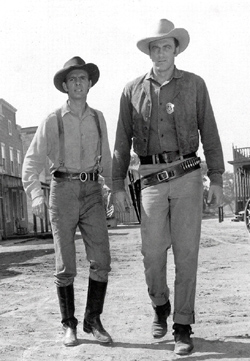
At 6-foot-7, James Arness towered over his 6-foot-2 "Gunsmoke" sidekick, Dennis Weaver.
Publicity photo.
[Click to enlarge]
|
|
Signal: One actor who looked rather small when he stood next to you — and yet, at 6-foot-2, he was no short man — was Dennis Weaver. We lost him in February. Were you close?
Arness: We were very close in the early years, particularly. He was on the first six years of the show, which were the half-hour shows. Then he came in and out for the next couple of years. But then he split off and went on to do many other things — which is what he really wanted to do, after doing six or seven years of Chester.
He was very talented, actually. A talented stage actor. A Shakespearean actor and everything. I think he just got to the point where Chester wasn't making it for him, and he had this urge to go out. Which nobody blamed him for, but of course we were very concerned, when he was leaving, because we didn't know who could replace him (when) we needed a character—
Signal: A sidekick.
Arness: Right. Fortunately, we lucked out and got Kenny Curtis, who worked in the character of Festus. He was also a heck of a actor. That was a real characterization for Kenny, because he was actually a very sophisticated guy. He was a singer. He had a great voice. He sang with Tommy Dorsey's band. Festus was a real acting job for him. Yeah, it was.
Boy, what a great addition to the show. He stepped in and filled that realm that Chester had been in. But not just like that. He was actually much more hard-core. He could go out and do stuff by himself. Bring in bad guys. He was a heck of a character, and it just worked like gangbusters.
Signal: Dennis Weaver left the show and did the first Steven Spielberg film, "Duel" (1971), up Sierra Highway in Saugus. Of course Weaver starred as "McCloud," and he ended up doing the bumpers for the Encore Westerns channel. Do you watch Westerns on TV?
Arness: Oh, every day. Whenever I can. I always watch "Gunsmoke."
Signal: You do?
Arness: Oh, yeah. I love to watch the old shows. Many of them I never had chance to see when we did them, because it was (on television) on Saturday night and I was usually out doing something else at the time. So there are many of the shows that I had never seen.
It's a lot of fun to watch. TV Land, they're on there; we were on the Westerns channel but then a few months ago they took us off. That was too bad, because we were on two hours every night, seven days a week. That's 14 hours a week, plus TV land—
Signal: A lot of residuals, huh?
Arness: I wish. But people still — we get 100 e-mails a week from people who still watch it. It's still out there.
Signal: JamesArness.com is your Web site, right?
Arness: Yes. And if (people) want any information about what's going on in our lives, you can get pictures there, books, all kinds of stuff.
Signal: Something you mentioned on your Web site recently were some mallard ducks out back that you've named Matt and Miss Kitty. What's the story there?

Matt and Kitty on the deck of Jim and Janet Arness' pool.
Photo by Brad Hoffarth/SCVTV.
[Click to enlarge]
|
|
Arness: I don't know, they just came in for the last three or four years. They usually stay for a few days and then head out, but now they are staying. They have been here about three weeks ... now we cant get rid of them. We want to get the pool started, but as long as they're swimming around there—
Signal: We're waiting to see them fly into the house.
Arness: Yeah, they might. I got up the other day and one of them was looking right in the window like, "Hey, feed me, would you?" It's fun to have them, though. It's great.
Signal: Is anybody making a good Western these days?
Arness: Gee, I don't think so. As far as I know, there aren't any Westerns — even movie Westerns.
Signal: Well, there's "Brokeback Mountain," which you might call a Western. Did you see that one?
Arness: (Laughing) No, I haven't seen it yet.
Signal: Yet?
Arness: If it ever gets out on TV, we would probably see it.
Signal: Is there anything that came after "Gunsmoke" in the Western genre that you liked?
Arness: We did a show after "Gunsmoke," of course — "How the West Was Won." We wound up being called "The Macahans."
We did that for, I believe, three seasons, and I had a doggone leg that kept getting worse on me. I was limping around and I had to have an operation. They decided that they wouldn't try to continue, because I would be out of commission for six months. So they just folded the show.
As far as I know, I don't think they have done many Westerns since then.
Signal: Going back to Melody Ranch, you started shooting "Gunsmoke" there in 1955. Melody Ranch burned down in August 1962. Were you shooting there all that time?
Arness: We were off and on there. Of course there were many other places we had gotten onto at the same time. I think we didn't really film there anymore.
Signal: Gene Autry owned Melody Ranch then; did you run into him out there?
Arness: Oh, I should say. We used to see him every once in a while. And then, of course, we (saw) him a number of times since. When he owned the Angels, he invited us out there to see a game and all.
Signal: Where would you stay when you were shooting at Melody Ranch?
Arness: We would drive home every night. Boy that was a drive—
Signal: Drive home here to Brentwood?
Arness: I lived in (Pacific) Palisades then, and there was no 405 Freeway. There was Sepulveda Boulevard. I would drive down Sunset to Sepulveda, and here you had this street with stop lights every two or three blocks, and 18-wheel trucks. ... I think it used to take me at least two hours to get to Melody Ranch.
Signal: Did you take San Fernando Road into the Santa Clarita Valley?
Arness: I would go out Sepulveda, and right at the end of the valley, you turn off (to) Placerita Canyon.
Signal: You'd come over the hill and see what — a bunch of sagebrush and chaparral? What do you remember of the way the Santa Clarita Valley looked at the time?
Arness: It was beautiful then. It was sort of virgin country. We could shoot any direction, up in the hills or down in the — it was great out there then. But it's like many other places now.
One place we did go quite a bit in the later years, the mid-years, was the Janss (Conejo) Ranch, which was out past Thousand Oaks. They had about a 15,000-acre ranch there, and everybody wanted to use it then. There would be three or four Westerns shooting out at the ranch at the same time. It was beautiful country. You could swing the camera around 360 degrees and you wouldn't see a house or a telephone pole or anything. Everybody loved being out there.
Signal: One way or another, they still manage to shoot the HBO series, "Deadwood," at Melody Ranch. Have you seen that one?
Arness: I have seen it, yeah, a couple of times. It —ŬI don't know. It seemed — I really didn't get hooked into it.
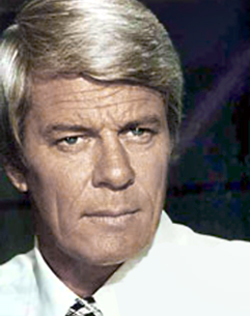
Three years his junior, Arness' brother, Peter Graves, is still working as an actor.
|
|
Signal: They use a lot of rough language in it—
Arness: Yeah, a lot. I guess they've got a audience there, but—
Signal: It's not your cup of tea?
Arness: Well, it — no. No, I don't think so.
Signal: You were born in 1923 in Minneapolis.
Arness: Right.
Signal: You had a brother.
Arness: Right.
Signal: Did you ever do a picture together?
Arness: We never did a picture together, (but) he actually directed a couple of "Gunsmokes." Of course he wound up having a great acting career himself.
Signal: His name was?
Arness: He took the name, Peter Graves. Graves is a family name. He came out here a couple of years after I did and took the name, "Graves."
He had a great career going himself there; still does. He did The Biography (Channel) shows for a long time and things of that type, and different series, too. He's had a real good run.
Signal: Is Arness your family name? You've been credited as "Aurness."
Arness: Well that was actually more our family name. Our actual Norwegian name is Aursnes, but it got too complicated. My grandfather came over from Norway and he went through Ellis Island, so they changed that name around (to) A-u-r—.
And then when I got into — the first picture I was ever in was called "The Farmer's Daughter" (1947). It was a movie, and the producer of that movie was a really nice guy, Dore Schary, who later became the head of MGM. He suggested, "Why don't you just drop the 'u' out and make 'Arness'?" I wasn't going to argue with the guy.
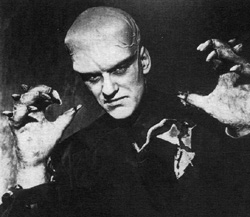
Arness' height worked to his advantage when he was cast in the title role in "The Thing (from Another World)" (1951).
James Arness collection.
[Click to enlarge]
|
|
Signal: That first film was after World War II—
Arness: Yes. When I got out of the Army, I went home to Minneapolis. I was there for about a year, and this friend of mine, who had gone through school and all, he called up — it was like Christmas week of 1945, and he had just gotten out. He said let's meet and have dinner. So we went downtown and met, and there was a blizzard going on down there. We had dinner and then came out and he said he met this guy from L.A. in the Navy He said, "We could be out there right now, walking around in our short sleeves and going to the beach ... I think we ought to go."
Anyway, we wound up coming out here. That was in January of '46 when I got here. I thought maybe I would just stay for three or four months until it warmed up at home a little, and then go back. But by that time, I had this part in this picture, "The Farmers Daughter."
Signal: How did you get your break?
Arness: We went to this acting school somebody suggested. We thought we would get jobs as extras. Somebody said we might be able to do that, but they said you should go to a acting school and learn a little bit about what its like. So that's what we did.
This agent came to the play one night and saw me, and then he took me over to Mr. Schary and (I) wound up getting this part.
So I had only been out in this town for about four months and I wind up in a great, big Academy Award-winning picture. It was incredible.
Signal: Going back to the war, you were on the beaches of Anzio in the invasion of Italy.
Arness: I was, for a short time. But it was a very intense time. I got wounded, hit in the leg. Unfortunately so many guys got terrible wounds, and many didn't get off the beach. It was a terrible thing over there. All war is.
Signal: Purple Heart?
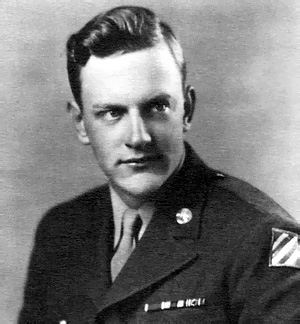
Army Private James K. Arness (Aurness) landed at Anzio for the invasion
of fascist Italy in 1944. "The landing itself was almost bloodless," Arness later wrote, "but within 24 hours, the Germans
had begun to ring the beachhead with eight divisions to our two."
James Arness collection.
[Click to enlarge]
|
|
Arness: Yes, I wound up with that.
Signal: Apparently the leg wound didn't inhibit your new career in acting?
Arness: No. I was in the Army hospital for about a year, and they put you through a whole lot of physical rehab. I was in this Camp Carson out in Colorado, and you do all these exercises and then they start you walking. I wound up walking about 10 miles a day.
For a long time it didn't really bother me at all. But in later years, I began to get a little — you could tell the leg was doing something there. You could see in pictures, especially if you were aware of it beforehand. I had a little hitch in my getup there.
Signal: We'll have to watch for that hitch in your getup in the "Gunsmoke" reruns. What about your height? Did that ever stop you from getting a role you wanted?
Arness: It didn't seem to, really. In the early days before "Gunsmoke," I think I probably got parts because I was tall. Usually played heavies, part of a gang of heavies, and I think maybe I got cast in that thing because I was tall — a big guy, see?
I think a lot of the parts I had were because of my size. It worked out pretty well.
Signal: One of those "tall guy" roles before "Gunsmoke" was the title role in "The Thing from Another World" (1951). What is it like to be The Thing?
Arness: (Laughing) Well, it's always with me. But it was great. I was at the stage where I was trying to get any job I could, (and) that thing came along. I wasn't going to turn that down.
Signal: Looking through the credits, Kurt Russell appeared in "Gunsmoke" a couple of times, and he would go on to star in the John Carpenter remake of "The Thing" (1982).
Arness: That's right.
Signal: Did you ever see the remake?
Arness: We did see it, some time ago. It wasn't as good as ours, you know. It just didn't make it.
Signal: At 20 years, you hold the record for the longest continuous prime-time role played by a single actor. Any regrets about that?
Arness: No, not at all, really. I never had a time when I thought, Gee, I have been doing this long enough; I've got to go do something else. I never had that feeling at all.
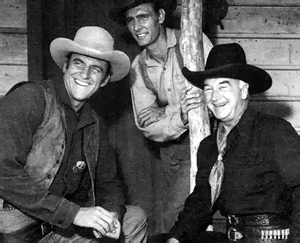
Two actors forever linked to their Hollywood roles: James Arness as Matt Dillon and William Boyd as Hopalong Cassidy. Dennis Weaver looks on.
James Arness collection.
[Click to enlarge]
|
|
Signal: People say it was hard to tell when Hopalong Cassidy stopped and William Boyd started. Did you ever run into that with yourself and Marshal Dillon?
Arness: Well, they inevitably become linked. Every time I would go out somewhere, most people would say, "Hi, Matt!" But that was all right.
Signal: How much of James Arness was there in Matt Dillon?
Arness: That's hard to say, really. That's a question you would have to ask somebody else. I don't know. I certainly felt comfortable after I had been in (the role) awhile.
Up to that point, I had been what you jokingly call a "two-page" actor. I would have a scene here, or a little scene there. But suddenly with "Gunsmoke," I had to do 15 pages every day, and all the dialogue and do the whole thing. I was in way over my head. I was very concerned about it, and it was very hard, the first couple of years, to get really into the character.
I did go and get some coaching, which helped me a lot. Once I got into that, from there on, it just seemed it was "there."
Signal: Did you eventually get to a point where you were influencing script? Stated differently, did you ever have to put your foot down and say, "No, Matt Dillon doesn't do that"?
Arness: No, not really, to any extent at all. Part of the show was that the writing was so really, really good. The stories, as I see them now, I realize how really fine the writing was in the show. I don't think any other Western series had writing that was anywhere close to us.
Signal: And no other dramatic series lasted so long in prime time. How could "Gunsmoke" compete for 20 years? What was its staying power?
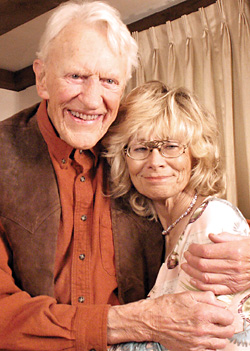
James and Janet (Surtees) Arness met in 1974 and married in 1978.
Photo by Brad Hoffarth/SCVTV.
[Click to enlarge]
|
|
Arness: I think No. 1, the stories were great and everything — but you did have this family of the four people, Matt, Kitty, Doc and Festus, and then later Buck Taylor came in, and he really fit in and joined the family. He had that family aspect. That was a very large part of it.
I think back in those early days, when dramatic shows came in — early television, (you had) guys like Milton Berle, who were great — but when you started putting dramatic shows on, it's like having a family come into your home every Saturday night. People look forward to seeing that family, and then seeing the story, as well.
The "Gunsmoke" family was the thing that people got used to, and (they) wanted to see that in their homes on Saturday nights, you see. That was a big factor.
Signal: What's it like to have been Matt Dillon for so long?
Arness: I feel like the luckiest guy in the world, because all these things just happened to me.
I had to do — I mean, I didn't even really want to do "Gunsmoke." I was doing a picture at the time they wanted me to come in (to test for "Gunsmoke"), and the director of the picture said, "Jeez, I don't think you want to get tied up in a series." If it goes a couple of years — he thought that maybe I was at a point where, if I got just the right part in a movie, maybe I would take off, see? He said, "I don't think you ought to do this." So I was going from his opinion. He was an old-time movie director. So I told the guys, at first, I didn't want to do it.
That's when Duke called me, and when he heard what I was saying, he said, "Don't be a fool." He said, "This is greatest thing that will ever happen to you. You will learn all about how to handle yourself and ride horses and do the stunts." He said, "You've got to go do it." I wasn't going to argue with that.
Signal: Who influenced you the greatest?
Arness: That would be hard to say. In relation to the show ... I don't know.
Signal: Any last words for the folks in Santa Clarita?
Arness: Just that I am extremely proud to have been invited to come up there and to have my name on the Walk of (Western Stars). I wish I could be there, I really do. But I will certainly be there in spirit, that's for sure.
(My wife) Janet and my son Jim, and of course Buck Taylor is a wonderful guy — he's going to be there and accept the presentation.
See this interview in its entirety today at 8:30 a.m., and watch for another "Newsmaker of the Week" on Wednesday at 9:30 p.m. on SCVTV Channel 20, available to Comcast and Time Warner Cable subscribers throughout the Santa Clarita Valley.